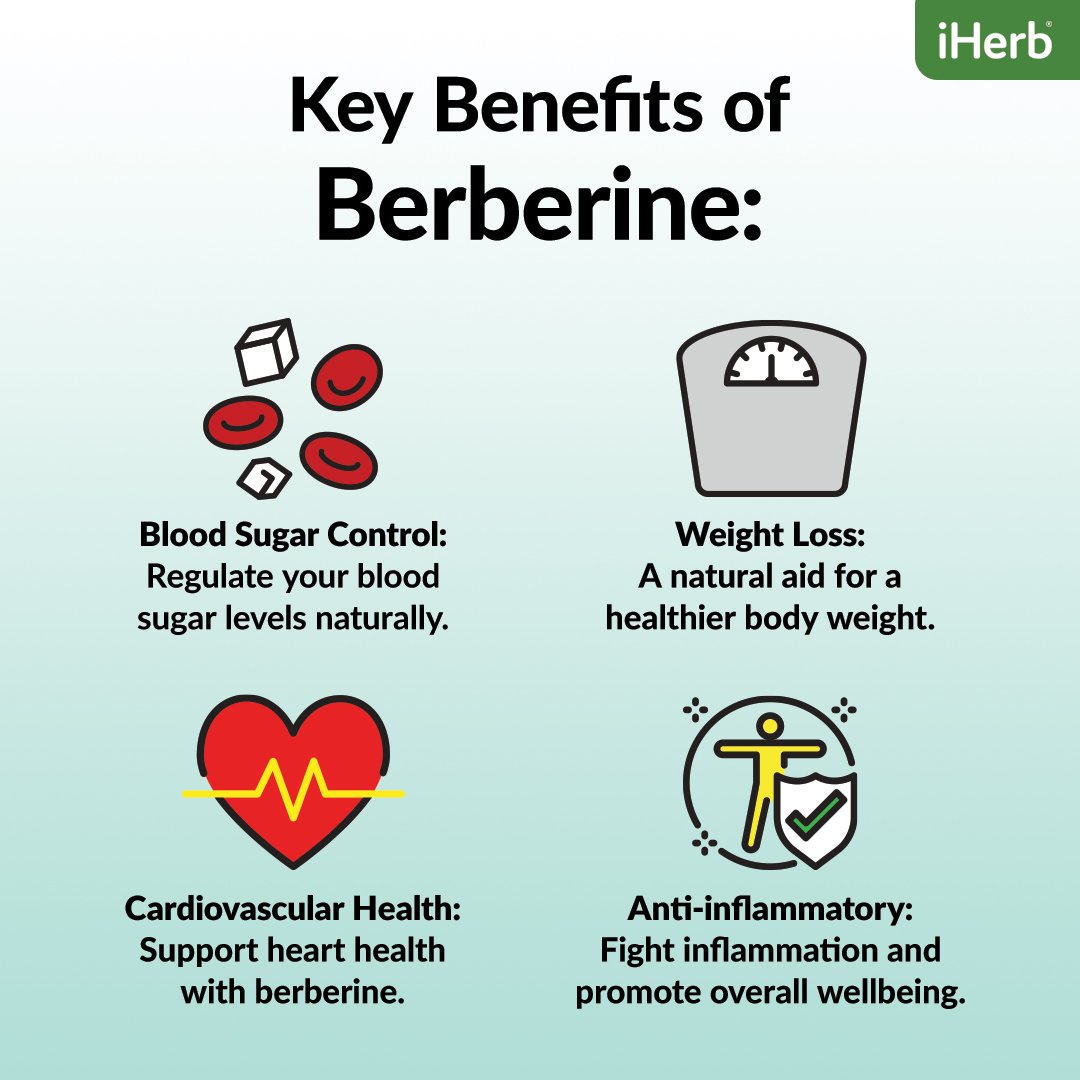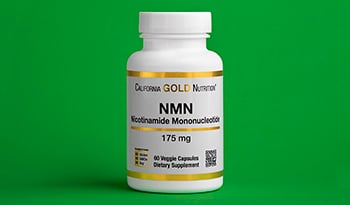Berberine Health Benefits: From Digestion To Weight Management

Berberine is getting a lot of attention on social media for its potential as a weight management aid, but what is berberine, and what are its health benefits?
What Is Berberine?
Berberine is an alkaloid compound found in many plants, most notably in goldenseal (Hydrastis canadensis), barberry (Berberis vulgaris), and goldthread (Coptis chinensis).
Over 5,000 scientific studies have been performed with berberine, including over 150 human clinical trials. The results from this immense scientific research are why berberine has emerged as a popular dietary supplement over the past decade.
Berberine’s Health Benefits

Research has shown that berberine can do a lot of good for health. Many of the health benefits of berberine supplementation result from its ability to improve digestive health by enhancing the gut microbiome's composition.
Since the intestinal microbiome plays an integral role in not only digestive health but also virtually every system in the body, many of the positive effects observed in clinical trials with berberine supplementation, such as helping to maintain proper blood sugar control, blood pressure, and body weight, are the result of the beneficial changes that berberine facilitates in the microbiome.
Digestion + Liver Health
The most well-researched beneficial effect of berberine on digestive health is its usefulness in helping resolve diarrhea caused by an imbalance in the intestinal microbiome. Berberine accomplishes this effect by exerting an antimicrobial effect against unwanted organisms while exerting little or no antimicrobial action against health-promoting bacterial species such as Lactobacilli and Bifidobacter species. It also exerts beneficial effects on an essential bacterium for the health of the intestinal lining, Akkermansia muciniphila.1-3
Many double-blind, placebo-controlled studies have confirmed berberine's benefits for digestive health.4-12 However, it is not appropriate to self-medicate with berberine in cases of intestinal infection. It is important to be properly monitored by your physician when dealing with any intestinal infection.
Berberine has also been shown to have benefits in irritable bowel syndrome (IBS), and several preliminary studies suggest that it may also be effective in small intestinal overgrowth (SIBO). In a 2015 double-blind study, 196 patients with IBS that included frequent bowel movements and diarrhea were randomized to receive either berberine (200 mg) or a placebo (vitamin C 200 mg) twice a day for eight weeks. The berberine group, but not the vitamin C group, reported significant improvement in diarrhea and less urgency and frequency in bowel movements. The berberine group also experienced a 64.6% reduction in abdominal pain and significantly decreased the overall IBS symptom score, anxiety score, and depression score. Lastly, and not surprisingly, berberine was associated with an increased quality of life score in patients, while no such change was seen in the placebo group.13
Several studies suggest berberine may be effective in SIBO. In addition to the benefits noted above in IBS, berberine inhibits bacterial and yeast overgrowth in the small intestine, and in animal models, berberine also improves intestinal motility. This action on motility is another key goal in patients with SIBO (and IBS).14
Berberine has shown significant effects in supporting liver health. Recent research has focused on its ability to support liver function in those with steatosis, the infiltration of fat into the liver leading to liver dysfunction. This issue is common in people who are overweight or obese or dealing with type 2 diabetes. Berberine at a dosage of 500 mg before meals three times a day has shown significant benefits in improving liver function in these subjects.15,16
Gut Health
As described above, in addition to exerting action against disease-causing organisms, berberine appears to promote the growth of health-promoting bacteria. The existing data on berberine is quite convincing that its health benefits in weight management, insulin resistance, and inflammation may largely result from modulating the gut microbiome.17-19
One of the significant changes observed with berberine supplementation on the gut microbiome is the increased abundance of the beneficial bacterium Akkermansia muciniphila. This bacterium plays a critical role in gut health because it works closely with intestinal cells to create the mucin layer that protects the intestinal lining from damage. Berberine increases the manufacture and secretion of mucin, and the term "muciniphila" literally translates to mucin-loving. Akkermansia muciniphila loves mucin and uses it as nourishment. The combination of improved mucin secretion and healthy levels of Akkermansia muciniphila means a healthy intestinal barrier.17
A thinning or absent mucin layer is associated with increased intestinal permeability (leaky gut) and inflammation. Akkermansia muciniphila colonization in the gut is inversely associated with obesity, diabetes, metabolic syndrome, and low-grade chronic inflammation. In other words, when the levels and activity of Aklermansia muciniphila are low, these disorders take root. These disorders are associated with altered gut barrier function due to reduced mucin protection. This leads to the absorption of many gut-derived toxins that trigger a cascade of different systems that promote chronic inflammation and insulin resistance.18
Berberine helps reverse this leaky-gut situation by promoting mucin production and the growth of Akkermansia muciniphila. This, in turn, leads to an improved intestinal barrier, reduced circulating levels of gut-derived toxins, and a significant reduction in inflammation.
Berberine also increases the levels of other health-promoting bacteria, such as Bifidobacterium. This species also promotes intestinal health, reduces absorption of gut-derived toxins, and reduces gut and systemic inflammation.19
Blood Sugar
Berberine has been extensively studied in over 50 double-blind clinical trials for supporting normal blood sugar, cholesterol, and blood pressure levels, as well as supporting liver health. These double-blind clinical trials in humans attest to berberine's efficacy and safety in promoting these health benefits.20-24
In regard to supporting blood sugar control, results showed quite convincingly that berberine (500 mg two to three times daily), along with lifestyle intervention, supports fasting blood sugar, after-meal blood sugar, and glycosylated hemoglobin (HbA1c) levels more than lifestyle intervention alone or a placebo. Newer forms of berberine are showing even better clinical benefits. For example, studies with Berbevis®, a patented Berberine Phospholipid Matrix, contained in Berberine Advanced from California Gold Nutrition, have shown even better results compared to regular berberine due to enhanced absorption. In one double-blind, placebo-controlled study of 49 subjects, those receiving 550 mg of Berbevis® twice daily for two months showed significant improvements in insulin sensitivity, blood sugar control, blood lipids, total fat mass (-6%), and abdominal (visceral) fat mass (-11%).25
And, in another double-blind study, Berbevis® at a dosage of 550 mg once daily showed similar benefits on blood sugar control, blood lipids, and body fat measurements, but researchers also showed an 11% decrease in the body fat to muscle mass ratio.[38] This last measurement indicates that Berbevis® may help promote loss of fat preferentially and preserve muscle mass.26
In addition to supporting normal total cholesterol levels, berberine has also been shown to support normal LDL cholesterol and triglyceride levels. It has also been shown to lower another blood lipid, apolipoprotein B, which is linked to an important indicator of vascular health by 15%.
GLP-1
Berberine produces these metabolic effects through various mechanisms. In addition to its effects on the microbiome, berberine has been shown to increase glucagon-like peptide-1 (GLP-1), a hormone secreted in the small intestine and colon by cells known as L-cells. GLP-1 enhances the action of insulin, leading to improved blood sugar control and the promotion of satiety.28
Drugs that work to mimic GLP-1, known as GLP-1 agonists, include semaglutide and tirzepatide have become popular drug treatments for diabetes and obesity. While berberine has some effects that support natural GLP-1 action, its weight loss effects are modest compared to the GLP-1 agonist drugs.
Energy
Berberine also activates AMP-activated protein kinase (AMPk), an enzyme involved in activating mitochondria and regulating the body's energy levels. By targeting this pathway, berberine induces the uptake of glucose into cells, where it is converted into energy. Activating AMPk is also key to berberine's function in regulating blood lipids, such as LDL cholesterol, total cholesterol, and triglycerides. This enzyme acts as a master switch, regulating energy production and storage as well as lipid metabolism. It helps burn fatty acids within cells, stabilizes the receptors for LDL cholesterol, and inhibits the formation of lipids by the liver.
Berberine also promotes insulin sensitivity by increasing the number and activity of available insulin receptors. This allows the same concentration of insulin to be more effective at moving glucose out of the bloodstream. Using insulin more efficiently is a foundation for successfully supporting healthy blood sugar levels, as well as appetite control and weight management.
Weight Management
As described above, berberine has shown some benefits in supporting weight management through the mechanisms described above, especially through its effects on increasing GLP-1 secretion and thereby improving insulin sensitivity and promoting feelings of satiety.27-28 But berberine also exerts many other mechanisms that help in weight management.29
At least a dozen double-blind, placebo-controlled clinical trials have looked at the weight management-promoting effects of berberine in humans. Most of the studies were in subjects dealing with the metabolic syndrome, a condition characterized by abdominal obesity, insulin resistance, and elevated blood lipids.
In addition to a reduction in body mass index, there were also improvements in insulin sensitivity, visceral fat mass, fat-regulating hormones, waist circumference, and markers of inflammation in these studies.30-31 In one study, 37 men and women with metabolic syndrome were given 300 mg of berberine three times per day for three months. The body mass index (BMI) levels dropped from 31.5 to 27.4.25. In another study, 500 mg of berberine three times per day caused an average of 5 pounds of weight loss over 12 weeks. And as described above, newer forms of berberine, such as Berbevis®, show even better results.
Side Effects + Safety Concerns
Berberine is generally well-tolerated at recommended dosage levels (500 mg two to three times daily before meals).
Side effects are generally mild and may include nausea, diarrhea, constipation, abdominal distension, and/or abdominal pain. Berberine and berberine-containing plants are not recommended for use during pregnancy.
Berberine may interfere with the absorption of tetracycline and related antibiotics. Berberine produces significant inhibition of CYP3A enzymes in humans. Because most drugs are metabolized by these enzymes, berberine may decrease the clearance of many medications, thereby potentiating their effect.
Berberine may enhance the effects of oral hypoglycemic drugs through its multitude of effects that improve insulin sensitivity. People on oral hypoglycemic drugs or insulin should monitor blood glucose levels if taking berberine. The prescribing physician may need to adjust the drug or insulin dosage.
References:
- Di Pierro F. Impact of berberine on human gut bacteria. Nutrafoods 2018;17:5-8.
- Dong C, Yu J, Yang Y, Zhang F, Su W, Fan Q, Wu C, Wu S. Berberine, a potential prebiotic to indirectly promote Akkermansia growth through stimulating gut mucin secretion. Biomed Pharmacother. 2021 Jul;139:111595.
- Zhang Y, Gu Y, Ren H, et al. Gut microbiome-related effects of berberine and probiotics on type 2 diabetes (the PREMOTE study). Nat Commun. 2020 Oct 6;11(1):5015.
- Imenshahidi M, Hosseinzadeh H. Berberis Vulgaris and Berberine: An Update Review. Phytother Res. 2016 Nov;30(11):1745-1764.
- Bhakat MP, Nandi N, Pal HK, et al. Therapeutic trial of berberine sulphate in non-specific gastroenteritis. Indian Med J 1974;68:19-23.
- Desai AB, Shah KM, Shah DM. Berberine in the treatment of diarrhoea. Ind Pediatr 1971;8:462-465.
- Sack RB, Froehlich JL. Berberine inhibits intestinal secretory response of Vibrio cholerae toxins and Escherichia coli enterotoxins. Infect Immun 1982;35:471-475.
- Choudry VP, Sabir M, Bhide VN. Berberine in giardiasis. Indian Pediatr 1972;9:143-146.
- Kamat SA. Clinical trial with berberine hydrochloride for the control of diarrhoea in acute gastroenteritis. J Assoc Physicians India 1967;15:525-529.
- Khin-Maung-U, Myo-Khin, Nyunt-Nyunt-Wai, et al. Clinical trial of berberine in acute watery diarrhoea. BMJ 1985;291:1601-1605.
- Rabbani GH, Butler T, Knight J, et al. Randomized controlled trial of berberine sulfate therapy for diarrhea due to enterotoxigenic Escherichia coli andVibrio cholerae. J Infect Dis 1987;155:979-984.
- Khin-Maung-U, Myo-Khin, Nyunt-Nyunt-Wai, et al. Clinical trial of berberine in acute watery diarrhoea. Br Med J (Clin Res Ed). 1985 Dec 7;291(6509):1601-5
- Chen C, Tao C, Liu Z, et al. A Randomized Clinical Trial of Berberine Hydrochloride in Patients with Diarrhea-Predominant Irritable Bowel Syndrome. Phytother Res. 2015 Nov;29(11):1822-7.
- Chen C, Lu M, Pan Q, et al. Berberine Improves Intestinal Motility and Visceral Pain in the Mouse Models Mimicking Diarrhea-Predominant Irritable Bowel Syndrome (IBS-D) Symptoms in an Opioid-Receptor Dependent Manner. PLoS One. 2015 Dec 23;10(12):e0145556.
- Koperska A, Moszak M, Seraszek-Jaros A, et al. Does berberine impact anthropometric, hepatic, and metabolic parameters in patients with metabolic dysfunction-associated fatty liver disease? Randomized, double-blind placebo-controlled trial. J Physiol Pharmacol. 2024 Jun;75(3).
- Nie Q, Li M, Huang C, Yuan Y, et al. The clinical efficacy and safety of berberine in the treatment of non-alcoholic fatty liver disease: a meta-analysis and systematic review. J Transl Med. 2024 Mar 1;22(1):225.
- Ghotaslou R, Nabizadeh E, Memar MY, et al. The metabolic, protective, and immune functions of Akkermansia muciniphila. Microbiol Res. 2023 Jan;266:127245.
- Li J, Yang G, Zhang Q, Liu Z, Jiang X, Xin Y. Function of Akkermansia muciniphila in type 2 diabetes and related diseases. Front Microbiol. 2023 Jun 15;14:1172400.Gupte S. Use of berberine in the treatment of giardiasis. Am J Dis Child 1975;129:866.
- Ming J, Yu X, Xu X, et al. Effectiveness and safety of Bifidobacterium and berberine in human hyperglycemia and their regulatory effect on the gut microbiota: a multi-center, double-blind, randomized, parallel-controlled study. Genome Med. 2021 Aug 9;13(1):125.
- Guo J, Chen H, Zhang X, et al. The Effect of Berberine on Metabolic Profiles in Type 2 Diabetic Patients: A Systematic Review and Meta-Analysis of Randomized Controlled Trials. Oxid Med Cell Longev. 2021 Dec 15;2021:2074610.
- Panigrahi A, Mohanty S. Efficacy and safety of HIMABERB® Berberine on glycemic control in patients with prediabetes: double-blind, placebo-controlled, and randomized pilot trial. BMC Endocr Disord. 2023 Sep 7;23(1):190. \
- Zhao JV, Yeung WF, Chan YH, Vackova D, Leung JYY, Ip DKM, Zhao J, Ho WK, Tse HF, Schooling CM. Effect of Berberine on Cardiovascular Disease Risk Factors: A Mechanistic Randomized Controlled Trial. Nutrients. 2021 Jul 26;13(8):2550.
- Blais JE, Huang X, Zhao JV. Overall and Sex-Specific Effect of Berberine for the Treatment of Dyslipidemia in Adults: A Systematic Review and Meta-Analysis of Randomized Placebo-Controlled Trials. Drugs. 2023 Apr;83(5):403-427.
- Yang L, Zhu W, Zhang X, Zhou X, Wu W, Shen T. Efficacy and safety of berberine for several cardiovascular diseases: A systematic review and meta-analysis of randomized controlled trials. Phytomedicine. 2023 Apr;112:154716.
- Rondanelli M, Gasparri C, Petrangolini G, et al. Berberine phospholipid exerts a positive effect on the glycemic profile of overweight subjects with impaired fasting blood glucose (IFG): a randomized double-blind placebo-controlled clinical trial. Eur Rev Med Pharmacol Sci. 2023 Jul;27(14):6718-6727.
- Cesarone MR, Hu S, Belcaro G, et al. Borderline hyperlipidemia preventive management with Berberine PL in asymptomatic prevention of early atherosclerosis. Minerva Gastroenterol (Torino). 2023 Oct 19.
- Araj-Khodaei M, Ayati MH, Azizi Zeinalhajlou A, et al. Berberine-induced glucagon-like peptide-1 and its mechanism for controlling type 2 diabetes mellitus: a comprehensive pathway review. Arch Physiol Biochem. 2023 Nov 3:1-8
- Yang WL, Zhang CY, Ji WY, et al. Berberine Metabolites Stimulate GLP-1 Secretion by Alleviating Oxidative Stress and Mitochondrial Dysfunction. Am J Chin Med. 2024 Feb 8:1-22.
- Askari VR, Khosravi K, Baradaran Rahimi V, Garzoli S. A Mechanistic Review on How Berberine Use Combats Diabetes and Related Complications: Molecular, Cellular, and Metabolic Effects. Pharmaceuticals (Basel). 2023 Dec 20;17(1):7.
- Asbaghi O, Ghanbari N, Shekari M, Reiner Ž, Amirani E, Hallajzadeh J, Mirsafaei L, Asemi Z. The effect of berberine supplementation on obesity parameters, inflammation and liver function enzymes: A systematic review and meta-analysis of randomized controlled trials. Clin Nutr ESPEN. 2020 Aug;38:43-49.
- Xiong P, Niu L, Talaei S, Kord-Varkaneh H, Clark CCT, Găman MA, Rahmani J, Dorosti M, Mousavi SM, Zarezadeh M, Taghizade-Bilondi H, Zhang J. The effect of berberine supplementation on obesity indices: A dose-response meta-analysis and systematic review of randomized controlled trials. Complement Ther Clin Pract. 2020 May;39:101113.
DISCLAIMER:This Wellness Hub does not intend to provide diagnosis...
















































































 Table of Contents
Table of Contents















